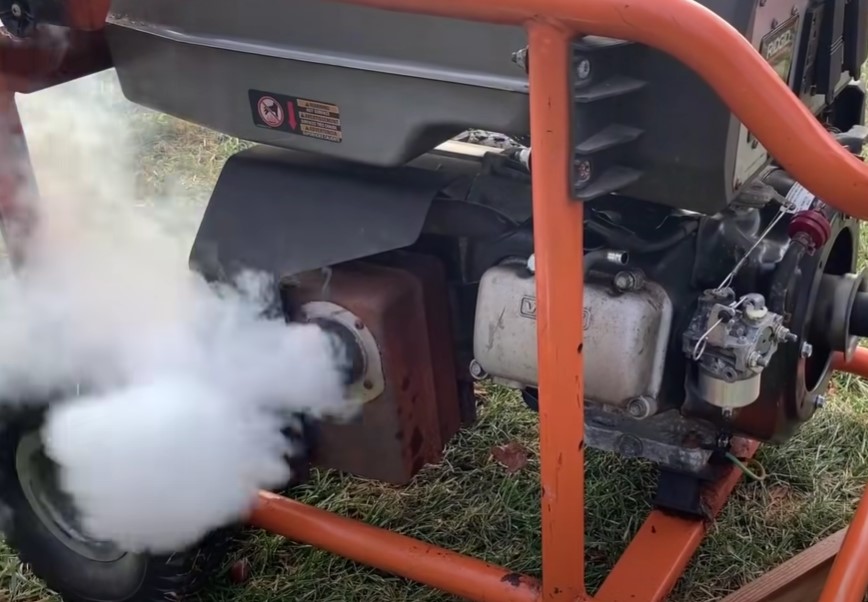Generators are indispensable assets in many homes and businesses. It ensures a steady supply of power during outages or in remote areas. However, you might have noticed your generator emitting smoke, a concerning sign that warrants immediate attention.
In this article, we will explain why your generator might be smoking and how you can rectify the situation. Without further ado, let’s get started!
Why is My Generator Smoking?
Generator smoking can signal problems like overloading, fuel issues, oil leakage, or clogged air filters. Poor combustion due to carbon buildup, spark plug problems, or exhaust blockages can also cause smoke. Immediate action is crucial: shut down the generator, identify the issue, and consult the manual or a technician. Regular maintenance prevents such problems, ensuring safe and efficient generator operation.
why is my generator blowing white smoke?
If your generator is blowing white smoke, it’s usually a sign of an issue within the system that needs immediate attention. Here are the most common causes:
Fuel Combustion Issues
White smoke often signals that the fuel in the generator is not being fully burned. This incomplete combustion could be due to a problem with the carburetor or fuel injector, such as a blockage or malfunction.
Coolant Leakage
White smoke may also indicate an issue with the cylinder head or head gasket. If these components are damaged, coolant may leak into the combustion chamber, causing white smoke as the coolant burns along with the fuel.

Incorrect Fuel Mixture
If the mixture of fuel is incorrect, for example, if there is too much oil mixed with gasoline (in the case of two-stroke engines), it can result in white smoke. The oil gets burned along with the fuel, creating a whitish smoke.
Poor Quality Fuel
Using poor quality or old, degraded fuel can also cause white smoke. Over time, gasoline can degrade, which leads to less efficient combustion and subsequently white smoke.
In any case, continuous emission of white smoke from your generator is not normal and should be addressed. If the smoke doesn’t stop after the generator has warmed up or if it continues after you’ve replaced the fuel, it’s advisable to have the generator checked and serviced by a professional to prevent serious damage.
petrol generator smoking from exhaust
If your petrol generator is smoking from the exhaust, it’s likely indicating an internal issue that requires your attention. The color of the smoke can help identify the possible cause:
White Smoke
White smoke from a petrol generator typically indicates unburned fuel or coolant leaks. It can occur when the generator is started in cold conditions, causing the fuel to not burn completely. Alternatively, if the cylinder head or head gasket is damaged, coolant might leak into the combustion chamber and burn along with the fuel, resulting in white smoke.
Blue Smoke
Blue smoke is often a sign of an oil-related problem. This usually means oil is getting into the combustion chamber and burning along with the fuel, producing a bluish smoke. This could be due to overfilling the oil reservoir, worn-out cylinder walls, piston rings, or faulty valve seals.
Black Smoke
Black smoke often means that the petrol generator is running rich, which means it’s burning too much fuel and not enough air. This could be caused by a clogged air filter, problems with the carburetor, or issues with the fuel injector.
If you notice your petrol generator smoking continuously, it’s crucial to identify the color of the smoke and rectify the underlying problem. If you’re unsure or unable to fix the problem, it’s advisable to consult with a professional to prevent further damage to the generator. Regular maintenance can also help prevent these issues and ensure your generator runs efficiently.
generator smoking after an oil change
Seeing smoke from your generator after an oil change can be concerning, but the cause may often be traced back to a few common issues related to the oil change itself:
Overfilled Oil Reservoir
If you’ve added too much oil during the oil change, the excess oil can end up in the combustion chamber, causing the generator to emit smoke. It’s crucial to fill the oil to the correct level as specified by the manufacturer’s guidelines.

Incorrect Oil Type
Using the wrong type of oil for your specific generator model can also cause smoking. Always refer to the generator’s owner manual to determine the correct type and viscosity of oil to use.
Residual Oil Burn Off
If any oil was spilled onto the generator engine or exhaust during the oil change, it might burn off when the generator is started, causing smoke. This usually clears up once the residual oil has completely burned off.
Old or Contaminated Oil in Combustion Chamber
Even after an oil change, there may still be some old or contaminated oil left in the combustion chamber. When the generator starts, this old oil will burn and could produce smoke. This should stop after the generator has been running for a while.
It’s important to monitor the situation after seeing your generator smoke post an oil change. If the smoke doesn’t clear up after a short while or if it’s excessive, it’s recommended to stop the generator and consult with a professional.
diesel generator white smoke
White smoke from a diesel generator could be a sign of various issues. Let’s look at some of the potential causes:
Incorrect Fuel-Air Mixture
White smoke can be a sign of an incorrect fuel-to-air mixture – specifically, too much fuel and not enough air. This can result in incomplete combustion, where the unburned fuel particles are expelled as white or light grey smoke.
Fuel Quality Issues
Low-quality or contaminated diesel fuel can lead to incomplete combustion, resulting in white smoke. Always ensure you’re using high-quality, clean fuel in your generator.
Cold Engine
It’s common for diesel engines to emit white smoke when starting in cold conditions. The white smoke occurs because the fuel doesn’t burn completely when the engine is still cold. As the engine warms up, this should stop.
Injector Problems
If your diesel generator has a faulty injector, it may deliver too much fuel into the combustion chamber, causing an overly rich fuel-air mixture and incomplete combustion, leading to white smoke.
Coolant Leak
A coolant leak into the combustion chamber could also cause white smoke. This can happen if the head gasket is damaged or if there’s a crack in the cylinder head or engine block.
If your diesel generator continuously emits white smoke, it’s essential to identify and rectify the underlying problem promptly. In case you are unable to diagnose the cause or if the problem persists, consult a professional to prevent serious damage to your generator. Regular maintenance is crucial in keeping your generator in top shape and avoiding issues like these.
diesel generator black smoke
If your diesel generator is emitting black smoke, it’s often a sign of an issue that requires immediate attention. Here are a few common causes:
Over fueling
Black smoke from a diesel generator often indicates over-fueling or a rich air-fuel mixture. This means there’s too much fuel and not enough air for complete combustion, causing excess fuel to be expelled as black smoke.
Clogged Air Filter
A dirty or clogged air filter restricts the amount of air entering the combustion chamber. This can result in an overly rich fuel-air mixture and subsequently black smoke. Regular cleaning or replacement of the air filter can help prevent this issue.
Fuel Injector Problems
If the fuel injector is faulty or not properly adjusted, it can supply too much fuel to the combustion chamber, resulting in black smoke. It’s important to regularly inspect the fuel injector and ensure it’s in good condition.
Poor Quality Fuel
Using poor-quality diesel can lead to incomplete combustion and black smoke. Always use high-quality fuel for your generator.
Overloading
Overloading the generator beyond its rated capacity can cause it to overheat, resulting in incomplete combustion and black smoke. Always ensure you’re running the generator within its rated capacity.
Regardless of the cause, continuous emission of black smoke from a diesel generator is a sign that the generator isn’t running efficiently and could potentially be damaged if the issue isn’t rectified. If you’re unsure about how to fix the problem, it’s advisable to call a professional. Regular maintenance is key to preventing such issues and ensuring the longevity of your generator.
how to fix a smoking generator?
Fixing a smoking generator involves diagnosing the problem based on the color of the smoke and the generator’s other symptoms. Here are some general steps to fix a smoking generator:
1. Identify the Color of the Smoke:
- White Smoke: This is often due to unburnt fuel, coolant leaks, or problems with the fuel injector. It can also occur due to low-quality fuel or during cold start-ups.
- Blue Smoke: Blue smoke usually indicates oil is getting into the combustion chamber, possibly due to overfilling the oil tank, worn cylinder walls or rings, or damaged valve seals.
- Black Smoke: This could mean the generator is running rich, i.e., there’s too much fuel and not enough air. It could be due to a clogged air filter, a malfunctioning carburetor, or problems with the fuel injector.
2. Fix Based on Smoke Color:
- White Smoke:
- If it’s due to a cold start, let the generator warm up to see if the smoke clears.
- Check your fuel quality and replace it if necessary.
- If the smoke persists, inspect for a coolant leak or a faulty injector. These repairs may require a professional.
- Blue Smoke:
- Check the oil level. If it’s overfilled, drain the excess oil.
- If it’s not due to overfilling, check the cylinder walls, rings, and valve seals. These may require professional servicing.
- Black Smoke:
- Clean or replace the air filter to ensure sufficient air supply.
- Check the carburetor and fuel injector for any malfunctions. Again, these might need professional attention.
- Make sure you’re not overloading your generator beyond its capacity.
Conclusion
Remember, these are general solutions based on typical symptoms. If you’re unsure about any step or if the smoking persists, it’s advisable to consult a professional to avoid causing more damage to your generator. Regular maintenance is crucial in preventing such issues from arising.
Also Read:
- Troubleshooting Common Westinghouse Generator Problems
- Onan 4000 Generator Oil Type (Troubleshooting)
- Are All Honda Generator Keys the Same?
Recent Posts
Yes, synthetic oil can generally be used in generators. It offers superior lubrication, improved resistance to temperature variations, and longevity compared to conventional oil, which can enhance...
In today's digital age, our dependency on computers and other electronic devices is undeniable. But what happens when a power outage occurs? This is where generators come in. However, is it safe to...
